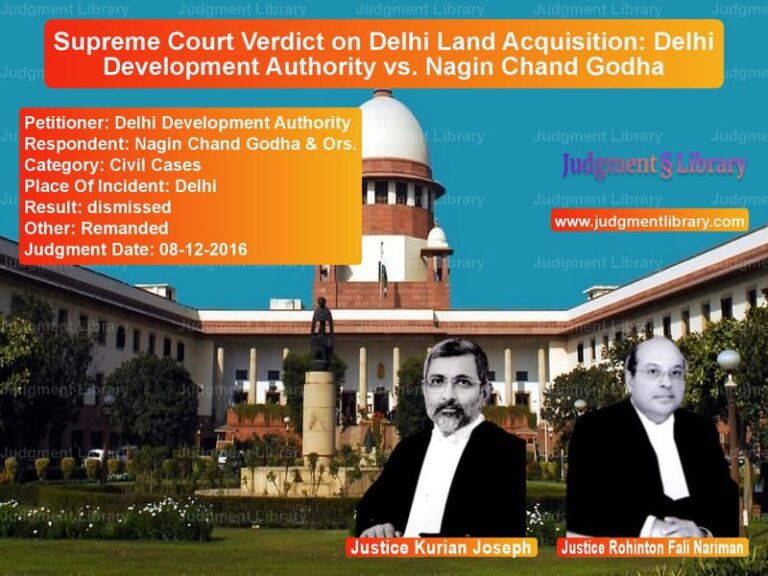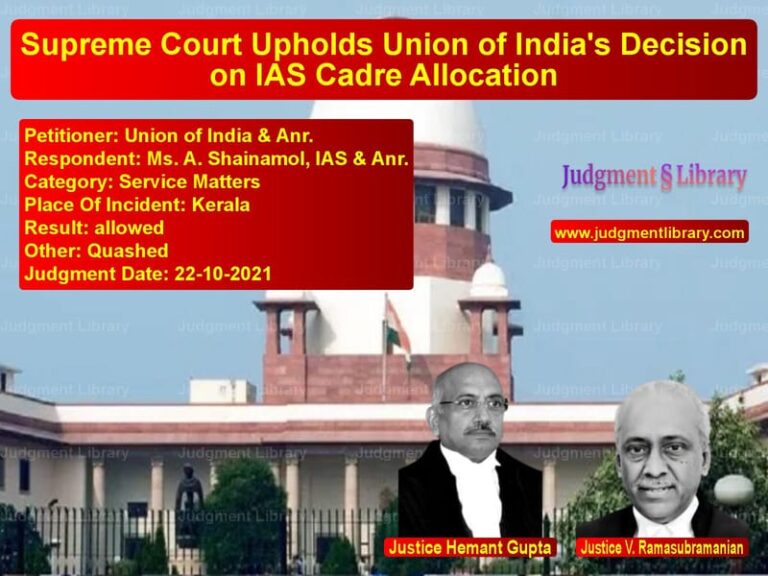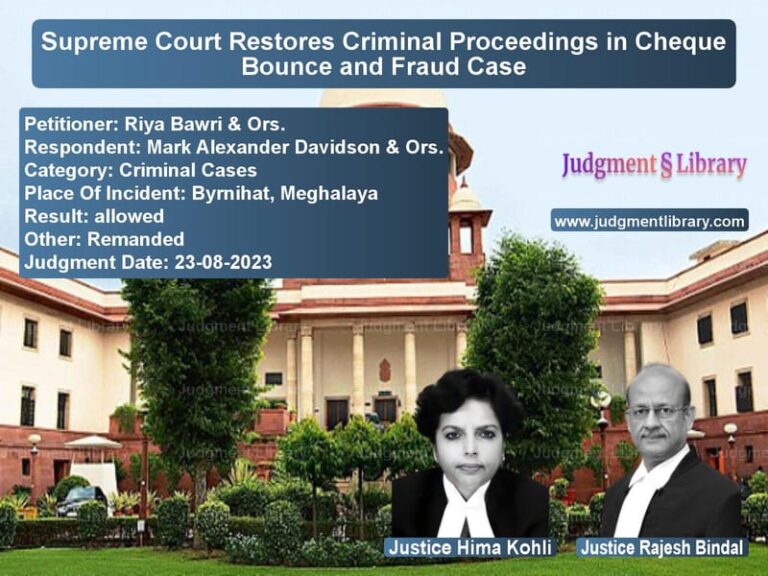Supreme Court Restores Appeal in Municipal Corporation Dispute
The case of Arun Babulal Parashar v. Ahmedabad Municipal Corporation revolved around the maintainability of an appeal before the Division Bench of the Gujarat High Court against a judgment passed by a Single Judge. The Supreme Court, in its judgment dated August 1, 2016, ruled in favor of the appellant and directed the High Court to restore and hear the appeal on its merits.
Background of the Case
The appellant, Arun Babulal Parashar, had initially filed a case against the Ahmedabad Municipal Corporation. After the Single Judge of the High Court ruled on the matter, the appellant sought to challenge the decision by filing an appeal before the Division Bench. However, the Division Bench held that such an appeal was not maintainable.
Disagreeing with this ruling, the appellant approached the Supreme Court, arguing that the Division Bench had erred in rejecting the appeal. The Supreme Court was required to determine whether an intra-court appeal was maintainable in this case.
Legal Issues
The Supreme Court had to address the following questions:
- Whether the Division Bench of the Gujarat High Court was correct in holding that the appeal was not maintainable.
- Whether previous Supreme Court rulings on similar issues were applicable in this case.
- What course of action should be taken to ensure proper adjudication of the appeal?
Petitioner’s Arguments (Arun Babulal Parashar)
The petitioner argued:
- The Division Bench wrongly held that the appeal was not maintainable.
- Precedents established by the Supreme Court in similar cases supported his right to file an appeal.
- The decision of the Single Judge was flawed and needed to be reviewed by a larger bench.
Respondent’s Arguments (Ahmedabad Municipal Corporation)
The respondent contended:
- The appeal before the Division Bench was rightly dismissed as not maintainable.
- The High Court had correctly interpreted the procedural laws governing intra-court appeals.
- The matter had already been settled by the ruling of the Single Judge, and no further appeal was necessary.
Supreme Court’s Observations and Ruling
1. The Issue is Covered by Precedents
The Supreme Court cited its own ruling in Jogendra Sinhji Vijay Singhji v. State of Gujarat & Others, reported in (2015) 9 SCC 1:
“That issue is no more Res Integra and is covered in favor of the appellant in ‘Jogendra Sinhji Vijay Singhji v. State of Gujarat & Ors.’”
This meant that the legal question had already been settled by the Supreme Court in an earlier case, which held that such appeals were maintainable.
2. Division Bench Erred in Dismissing the Appeal
The Court observed:
“Therefore, the impugned Judgment of the Division Bench in LPA No. 298 of 2014 is set aside.”
This clearly indicated that the Division Bench’s decision was incorrect and needed to be overturned.
3. The Appeal Must Be Heard on Merits
The Supreme Court remitted the case back to the Division Bench and directed:
“The matter is remitted to the Division Bench of the High Court. The appeal shall stand restored, and the High Court is requested to dispose of the same expeditiously on merits.”
This ensured that the appellant’s claims would be heard and adjudicated properly.
Final Verdict
The Supreme Court disposed of the appeal with the following directions:
- The judgment of the Division Bench, which had dismissed the appeal, was set aside.
- The case was remitted to the Division Bench of the Gujarat High Court.
- The High Court was instructed to restore the appeal and decide the matter on its merits.
- The case should be handled expeditiously.
Key Takeaways
- The Supreme Court reaffirmed that appeals before the Division Bench are maintainable in such cases.
- Legal precedents must be followed to ensure consistency in judicial decisions.
- Matters should be decided on their merits rather than being dismissed on procedural grounds.
Impact of the Judgment
The ruling provided clarity on intra-court appeals in the Gujarat High Court and reaffirmed that:
- Legal principles established in earlier Supreme Court decisions must be applied consistently.
- The rights of litigants to appeal should not be curtailed based on incorrect procedural interpretations.
- The High Court must ensure that all cases are decided based on their merits rather than being dismissed on technical grounds.
In conclusion, the Supreme Court’s decision in Arun Babulal Parashar v. Ahmedabad Municipal Corporation reinforced the importance of following legal precedents and ensuring fair adjudication of disputes. The ruling ensured that the appellant’s claims would be heard and decided based on their merits rather than being dismissed on technical grounds.
Don’t miss out on the full details! Download the complete judgment in PDF format below and gain valuable insights instantly!
Download Judgment: Arun Babulal Parasha vs Ahmedabad Municipal Supreme Court of India Judgment Dated 01-08-2016-1741878442308.pdf
Direct Downlaod Judgment: Direct downlaod this Judgment
See all petitions in Judicial Review
See all petitions in Judgment by Kurian Joseph
See all petitions in Judgment by Rohinton Fali Nariman
See all petitions in allowed
See all petitions in Remanded
See all petitions in supreme court of India judgments August 2016
See all petitions in 2016 judgments
See all posts in Civil Cases Category
See all allowed petitions in Civil Cases Category
See all Dismissed petitions in Civil Cases Category
See all partially allowed petitions in Civil Cases Category







